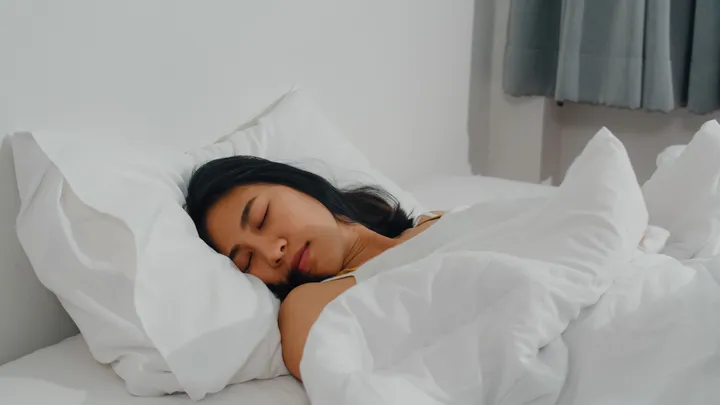The room was too quiet. Did I lock the front door? I forgot to reply to that email again. If I sleep now, I can only sleep six hours. Why can’t I sleep? Do I have to pee? Why does my back hurt? Maybe I’ll look at my phone until I feel tired.If I sleep now, I still have five and a half hours…
Do these thoughts sound familiar? If you’re one of the 33% of adults, 52% of pregnant women, or the 36% to 88% of people who are positive for COVID-19, you probably have your own set of quick, random thoughts that keep you awake.Get up at night.
Whether you suffer from sleep onset insomnia (which makes it difficult to relax in bed and fall asleep at night), sleep maintenance insomnia (which makes it difficult to fall asleep throughout the night), or both, it can lead to frustrating Daytime disorders, as the Sleep Foundation points out. Not getting enough sleep can impact your mental health, physical health, quality of life, and safety—and it’s all too common. The American Sleep Association says that while adults need seven to nine hours of sleep at night, about one-third report getting less than seven hours of sleep in a 24-hour period.
It turns out that many of our daily habits can make insomnia worse. We asked experts for advice on which mindless habits you should avoid to get a better night’s sleep. Their answers were (literally) eye-opening.
Looking at screens before bed.
Research shows that blue light from cell phones, tablets and TV screens suppresses the production of melatonin, a hormone that helps regulate circadian rhythms and helps you get better sleep, which makes it harder for people to fall asleep and causes brain waves to be more alert.
Even if you use a blue light filter or switch your device to night mode, looking at screens before bed can still interfere with your sleep by keeping your brain active and engaged. When we see something exciting or interesting, we are seeking a release of dopamine. When your brain is engaged and active, it’s less likely to shut down.
Having the TV on in your bedroom.
Watching TV to sleep may seem nice, but it doesn’t actually relax our bodies. This type of casual viewing can keep people awake longer than they expect. This also applies to passive use, such as having the TV on in the background even while doing other activities.
The constant chatter and loud noise made it impossible for us to sleep peacefully. We might feel pressure to finish an episode, or lose track of time entirely.
Engaging in social interaction.
Hanging out with friends is great, but it shouldn’t happen right before bed. Social interactions actually signal your body clock to stay alert and awake. Avoiding too much social interaction before bed can help your body relax, feel sleepy, and ultimately fall asleep.
Social media also falls into this category. It can lead to negative thoughts as people tend to compare themselves to others online. Feelings of self-doubt, jealousy, and sadness are associated with rumination and negative automatic thoughts that can be difficult to turn off.
Working from your bed — at any time of day.
Although many people are now working from home due to the ongoing pandemic, try to avoid the temptation to check email or work from bed.
Separation of work and sleeping areas is important, especially when many people are working remotely. Working in the same sleeping area may make it harder to concentrate, reduce your productivity, and then make it harder to fall asleep. Our brains receive mixed signals that the bedroom is typically a place for rest, but we want it to be alert and get to work.
Even answering one more email before bed can disrupt your sleep. Engaging in work-related activities in bed reduces the bed’s relationship with sleep, making it harder for the brain to understand that it’s time to relax, fall asleep, and sleep through the night.
Reading a thriller.
While reading can be relaxing, thrillers will keep you turning after lights out.
The purpose of a thriller is to keep you in suspense and keep you hooked. Books like these get your adrenaline pumping and activate a stress hormone called cortisol. While this may be fun during the day, it’s the worst thing you can do to induce and maintain sleep.
A violent, scary, or intense book may remain in your subconscious mind while you sleep and may appear in the form of disturbing dreams that may cause anxiety or disturb you when you wake up and sleep.
Instead, read something light and easy, or use an app like Calm, which has adult fairy tales available for download. The stories are soothing and put you to sleep with pleasant imagery, without anything jarring to bring negative thoughts into your conscious or subconscious mind.
Eating just before bed.
Eating dinner late at night may seem more convenient, but this habit is not conducive to sleep. The body needs time to digest properly, which happens when you get up and move around.
On the other hand, not eating before bed can also affect your sleep. If you’re lying there with your stomach growling, you won’t be able to sleep comfortably. If you find yourself frequently feeling hungry in bed, consider eating a snack before bed—this can help you find the right balance.
Throughout the day, consider eating more fiber and less saturated fat to help you sleep. One study found that eating more fiber increased the time people spent in deep, slow-wave sleep. On the other hand, eating more saturated fat is associated with less deep sleep, while consuming more sugar is associated with more sleep awakenings. These foods increase cortisol, a stress hormone that may wake you up.
Exercising too close to bedtime.
Exercise is a great way to regulate sleep—unless you do it right before bed.
Exercise can help increase the amount of slow-wave (or deep) sleep that rejuvenates the brain and body. Exercise can also help stabilize your mood, reduce stress, and help you sleep better. However, exercising before bed may give you a rush of endorphins, and you may feel more nervous and restless. This can make it harder for you to fall asleep.
Drinking alcohol before bed.
Drinking alcohol before bed can keep people awake at night. Alcohol is a central nervous system depressant, so it makes you feel sleepy, but your brain doesn’t move into deeper stages of sleep.
Drinking alcohol can also cause you to need to use the bathroom more in the middle of the night, leading to disrupted sleep.
Drinking coffee too late in the day.
Caffeinated beverages such as coffee, soda, and energy drinks are known to keep people awake at night.
It is recommended that you stop drinking coffee in the early afternoon. A general rule you should follow is to try not to eat anything containing caffeine within six hours of bedtime. If you do enjoy a hot drink during this time, try herbal tea or a decaffeinated beverage.
Not getting enough sunlight.
If you work indoors all day, it may affect your sleep. Combat this problem by spending a little time in the sun every day. Being outdoors and getting exposure to natural light is very beneficial for regulating our circadian rhythm (our internal body clock), which determines when we should go to sleep.
Light is the most powerful cue for circadian rhythms, responsible for regulating our sleep-wake patterns. Depending on the time of day, we can use light to help us keep this system regular. Bright light at night has a stimulating effect on our brains that can delay the time it takes to fall asleep, while daylight in the morning actually helps us fall asleep at night.
Having inconsistent sleep and wake times.
Going to bed early the night before, staying up late the next day, and then taking a nap can all affect our sleep. Try to wake up at the same time as much as possible (even if you’re tired in the morning) and avoid small ones. This will ensure you feel tired during the night, which helps regulate a more normal sleep-wake cycle.
To make this easier, it’s recommended to track your sleep and habits to see patterns over time and understand what’s really working for you. Improving sleep is a marathon, not a sprint. Make sure you give yourself enough time to evaluate any improvements after changing your habits.
Not giving yourself enough wind-down time or setting a bedtime routine.
Create a buffer between daytime and turning off the lights for bed. This can be 30-60 minutes and can include self-care activities such as a warm bath or gentle yoga before bed, mindfulness, journaling, progressive muscle relaxation, or reading.
Not having a calming sleep environment.
Where you sleep is also important. If possible, make your bedroom a calm, peaceful, and optimal space for sleeping.
It is important to keep your bedroom clean and tidy. A calm, uncluttered space can help you relax and fall asleep more easily. Taking the time to prepare your bedroom for sleep can become part of your bedtime routine, which will help you relax and unwind.
Ruminating over your thoughts.
Thinking about your to-do list or dealing with anxious thoughts? Yeah, that’s not a great way to promote restful sleep either.
Bedtime is often the only time of day when people have to be alone and keep their thoughts to themselves. The problem is, if not used constructively, it can lead to anxious thoughts about the next day, the next week, finances, love life, and children. While lying in bed, it’s a good idea to keep a notebook or journal next to your bed and write down these thoughts on paper so they can be released from your brain.
And keep in mind: Some people do have undiagnosed sleep disorders.
If you try changing these habits but still have trouble falling asleep, you may have an undiagnosed sleep disorder.
There are certainly some sleep disorders that can affect how awake a person is at night. Delayed sleep phase disorder often manifests itself as a lack of sleepiness at night and people find themselves getting up and doing things like scrolling social media. They think they are “procrastinating” bedtime, but in fact, their body clock is disrupted, meaning they are doing these activities because they are not sleepy, not because they are not sleepy
To help you get the best quality sleep possible, make an appointment with a sleep disorders specialist.It’s important to prioritize sleep.




